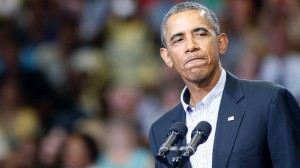Special to WorldTribune.com
By Gregory R. Copley, Editor, GIS/Defense & Foreign Affairs
U.S. voters and political parties were, by mid-February 2016, well down the path toward selecting the final candidates for the November 2016 Presidential election.
This determines how the United States would face the most decisive challenges for more than a century to its wealth, strength, and security. And yet not one coherent strategic policy had been outlined by any of the aspirants for power. Nor has the media probed this vacuum.
World Wars I and II did not, with the balance of hindsight, present the challenges to Western survival and U.S. leadership which the demographic, economic, social, and security threats of the coming decades will pose.

Significantly, all the candidates but one, Hillary Clinton, have based their premise for election on opposing virtually all of the actions and policies of incumbent President Barack Obama, and yet all, without exception, have accepted the overt as well as covert agendas of Mr. Obama in the global environment. These include the continued U.S. engagement in provoking and sustaining war in Syria (with its consequences for the destabilization of Europe and support of a rogue Turkey); the unrelenting anti-Russian “new Cold War” which has divided post-Soviet Russia from Europe and driven it into the arms of the People’s Republic of China (PRC); and an ill-considered approach in how to compete with the PRC.
In short, the Obama White House, which has been ideologically-driven, rather than U.S.-interests-driven, has dictated the agenda for the competing candidates. The U.S. under the next President will, then, either pursue strategic policy under the terms set by Obama, or will have to start re-formulating and reconstructing a viable global strategic policy. To do that, the successful candidate will have to un-do the year or more of jingoism and then re-educate the U.S. polity about the reality of the global strategic terrain. In other words, it must un-do, and reverse, the mindset and demonizing it has helped to reinforce in Washington, and among the U.S. electorate at large.
Moreover, for perhaps the first time, the ongoing U.S. Presidential election process has exposed the reality that the Democratic Party nominating process is about the top-down imposition of its preferred candidate upon the party and its members. The primaries and caucuses, supposed to deliver delegates to the final convention as determined by the state-by-state events, in fact count for little. The party’s nomenklatura selects “super delegates” who have pre-determined the outcome. The “preferred candidate” on this occasion is Hillary Clinton, but the process may yet be undone by criminal charges against her for unambiguous violations of security procedures when she was Secretary of State. Or by her own health issues. Her skeletons are out of the closet, but are never discussed.
There is little doubt that the Obama White House, conscious of the reality that a future president could un-do the work of Barack Obama, is clearly ready to re-inject Vice-President Joseph Biden into the race, or even Secretary of State John Kerry, or former New York City Mayor Bloomberg, should Hillary’s candidature become untenable.
The Republican Party, thrown from its path by the initial success of non-politician Donald Trump, has — as is typical in the Party’s primary process — focused on the cat-fight to determine the candidate, and has steered itself far from substantive discussion of economic policies, foreign policies, defense policies, or social policies. That is not as damaging as the fact that it has spent the time reinforcing an endorsement of what have been destructive U.S. policies on defense and foreign and strategic policy. This, truly, is an example of Rome burning while Nero fiddles.
The U.S. electorate knows that all is not well, which is why it has done the only thing open to it: to show support for the “anti-candidates”, Trump and Socialist Bernie Sanders. But ultimately the electorate has become victim of a process determined by power groups. Thus is “democracy” continually re-defined and its essence replaced by a manipulable calculus. The same calculus which the world criticized in the USSR.
Could any of the candidates begin now to think on, and expound, theories for the successful revival of U.S. strategic fortunes? Why not? U.S. politicians, however, have an inherent fear of disclosing any concrete plans, for fear that they could be criticized. Safer to claim that only they could make “America great again”, or provide the requisite bread and circuses to appease the entitlement generation. But this neglect of substance holds the entire world in its thrall of ignorance.
This is hardly the visionary and courageous stance of a Thomas Jefferson, or Teddy Roosevelt, or Ronald Reagan.
But what is that catchy circus tune which Nero now plays for us?
